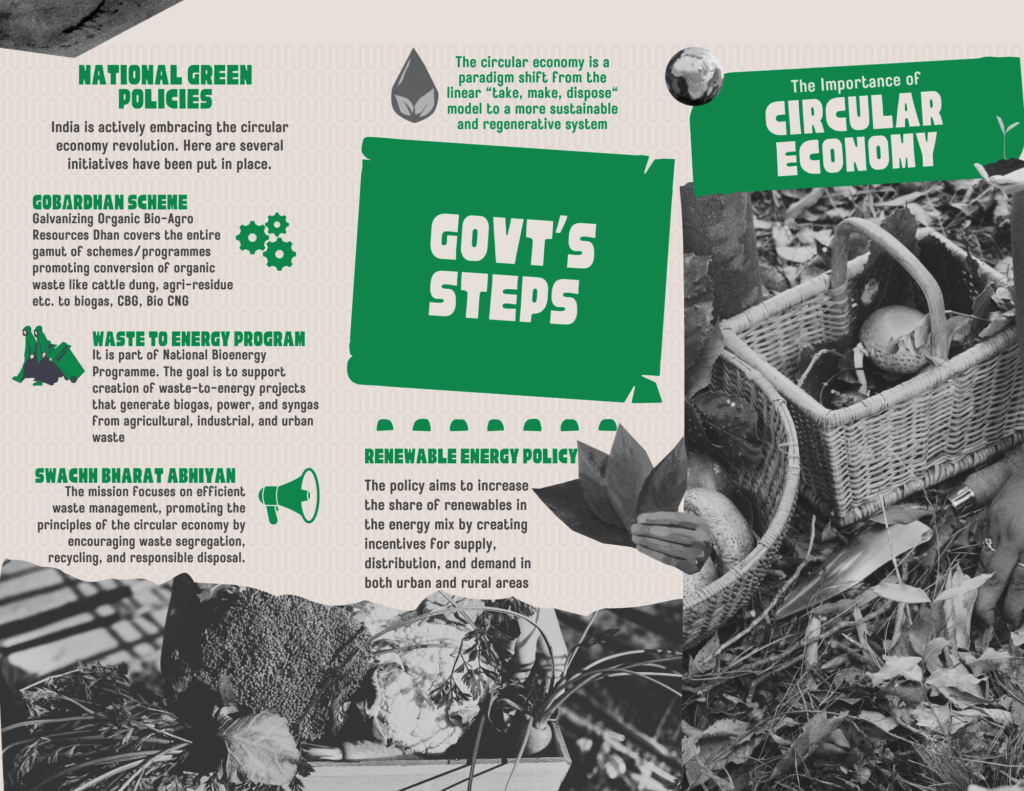The circular economy revolution: How ORS is transforming waste into sustainable products
Unusual snowfall, ravaging droughts, rising temperatures – these have been more frequent in the past year. In an era where climate concerns are at the forefront of global discourse, the circular economy has emerged as a ray of hope for sustainable development. India, with its rapidly growing population and increasing urbanization, is not immune to the challenges posed by traditional linear economies. However, a revolutionary shift towards a circular economy is gaining momentum in the country, offering a promising path towards a more sustainable future.
The circular economy is a paradigm shift from the linear “take, make, dispose” model to a more sustainable and regenerative system. In contrast to the traditional approach, the circular economy focuses on minimizing waste and maximizing the use of resources through strategies such as reducing, reusing, and recycling. This transformative concept aligns with the principles of sustainability and aims to decouple economic growth from the depletion of natural resources.
As per a report from IISD, our world economy is only 9.1% circular, leaving a massive “circularity gap”.
Harnessing the Power of Circular Economy
In the global quest for sustainable solutions, companies like Organic Recycling Systems are leading the charge towards a circular economy by redefining waste as a valuable resource. As the world grapples with environmental challenges, this innovative company stands out for its instrumental role in transforming organic waste into sustainable products, contributing to a more resilient and eco-friendly future.
Organic Recycling Systems (ORS) is at the forefront of the circular economy movement, challenging the conventional linear model of production and waste disposal. The company recognizes the potential of organic waste as a valuable resource rather than a burden on the environment. By adopting circular economy principles, ORS is actively engaged in maximizing resource efficiency, and creating a closed-loop system that benefits both the economy and the planet.

Key Initiatives and Solutions
ORS leads in innovative organic waste processing, using advanced composting and anaerobic digestion systems to turn organic waste into nutrient-rich compost and biogas, reducing environmental impact.
Beyond waste processing, ORS champions sustainable agriculture practices by promoting nutrient-rich compost as an organic fertilizer, fostering soil health and reducing reliance on chemical fertilizers. The company distinguishes itself through circular product development, creating sustainable products.
Additionally, the firm actively participates in programs and campaigns to raise awareness about the benefits of organic waste recycling and encourage responsible waste management practices.
Sanjeevak Carbonization Systems- a success case study
ORS’s impact is not just theoretical; it is reflected in tangible success stories. By partnering with local municipalities, businesses, and agricultural communities, the company has demonstrated the economic and environmental benefits of organic waste recycling. Reduced landfill usage, lower greenhouse gas emissions, and creating of sustainable, locally sourced products are just a few of the positive outcomes of ORS initiatives.
For instance, take our latest launch – Sanjeevak Carbonisation Systems (SCS). With a commitment to innovation, our innovative green technology transforms biomass waste into high-quality green charcoal products, ushering in a new era of eco-friendly and economically viable solutions.
SCS collects coconut shells, coffee bean shells, date seeds, groundnut and walnut shells from different farms, temples and crop processing units to convert them into charcoal. Using optimized efficiency, precision process control, and emission reduction, it converts biomass into charcoal.
This charcoal acts as fuel for barbecues, fireplaces and more. Catering to the current trends of the skincare and lifestyle product market, it is the raw material for the production of activated charcoal. Activated carbon is also used to purify liquids and gases in a variety of applications, including municipal drinking water, food and beverage processing, odor removal, industrial pollution control. Moreover, it can be used in medicines and suppositories due to its absorptive properties.
The unique design ensures superior heat transfer, minimal loss, and a higher conversion rate of fixed carbon. Advanced mechanisms guarantee precise regulation of temperature and overall processes, contributing to reduced harmful pollutant emissions.
Sanjeevak Carbonisation Systems stands as a testament to the success of creating sustainable, green alternatives through technology, setting a new standard for environmental stewardship and economic viability.